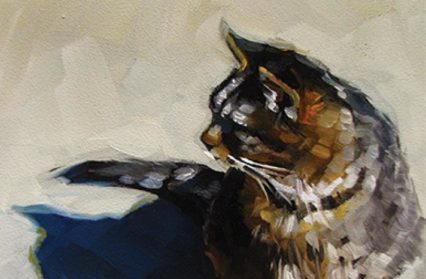Sophie Baggott reviews Emily Blewitt’s This Is Not A Rescue, a confessional collection of poetry with incredible range.
Spoiler alert: emerging Welsh poet Emily Blewitt’s new collection This Is Not A Rescue may indeed, contrary to claims, be about a rescue. My reason for so bold an assertion? Well, for a start, her poems hint gently and gratefully at a recovery from depression with the crucial support of family, friends and felines. Second, her acknowledgements end with a dedication to her husband and cat: ‘Both rescued me’, she states. Enough to go on there, I think.
The collection opens on its titular poem, summoning a coastal scene conjured up by ‘I’ and featuring ‘you’, though the two are merged really. ‘You’ is edging towards freedom, nudged by a modern-day knight in shining armour, that is, a figure handing over tools for DIY-use:
He’ll spot the pebbles that in secret you have sewn
into your skirts and give you the penknife to unpick them.
The male figure encourages ‘you’ to brave the waters, despite her fears, coaxing with the memory that she loves the ocean. It’s a touching piece, but perhaps pins too many immediate and significant thanks to another individual, detracting a little from the insistence against a rescue – an insistence underscored on the back cover.
The poems in Blewitt’s debut collection sometimes bob on a lighthearted surface of jocularity, sometimes plummet to depths of abuse, fear and depression. Upbeat or down, the voice always feels personal – confessional even – and this draws the reader into forming a curiosity about the person at the other end of the book’s life cycle.
Female protagonists howl in multifarious ways. One, the Woman Poet, is a ‘smouldering’ (this adjective entertains her) ‘wild bitch howling’. Her heels are ‘a stiletto pressed to the artery’, while her throat opens like ‘a kookaburra in a tree full of snakes’. She’s predatory, a force to be recolours with. Flick twenty pages on, and there’s an altogether different tone of howling. Throughout ‘In Recovery’ the poet doles out instructions, again presumably to herself: ‘When you cry, howl at the moon’, she exhorts. The poem outlines how fragile a person can feel when battling depression:
Understand that there are days you watch yourself
as though you are a balloon held aloft your body
by a slip of string you fear will break.
The collection broaches numerous raw, dark subjects, presented as traumas that flare in the poet’s memory. One particularly striking poem, ‘Sometimes I Think of Chapel’, first tamely dabs a painting of a young, frocked and frilly-socked girl who potters in the vestry. The second stanza reflects on her mother leading her up for the aisle for a final time, slipping in the subtle notion that her mother was abused: ‘…what her Uncle did to her, the congregation watching’. It’s a haunting image that reappears and catches one unawares throughout the collection.
Blewitt balances these heavy-going revelations with breezy, bright poems about Welshness. One of which, ‘How to Marry a Welsh Girl, was perused and enjoyed (if not entirely comprehended) by my very English boyfriend, who skimmed over the cawl and ‘griddle next to the currant-filled cakes’ with a bemused indifference. Little does he know the importance of a batch of fluffy, sugary picau ar y maen. Perhaps he was more concerned by the ‘da and brawd [who] won’t give up the chase’. The poem twinkles with traditions and stereotypes, all tongue-in-cheek of course:
Since you’re a Saes you won’t know
to carve a lovespoon, but I’ll tell you that birdsong in the morning
means luck; there might be donations of cheese, money, wool, bacon.
The collection sews in several love poems, including the radiant ‘My Colours – a favourite of mine among the poems in This Is Not A Rescue. The poet leads the addressee (the poems are in second person more often than not) through the colourful pictures dotted across her skin, including a portrait of Blodeuwedd on her right breast and a cicada on her collarbone. The ending lines explode with vivid shades:
I am an ephemera
of red kites
wheeling
through stormy skies
I am a riot
a cacophony
a bird of paradise
a gilded kingfisher
diving blue
The vibrancy and free-spirited atmosphere here is a far cry from the more greyscale talks that Blewitt has with herself at points in the collection. ‘Dear Emily’ describes the poet eyeing herself knowingly, steamed-up: ‘It is as though someone has smudged you | with greasy fingers’. This poem is virtually devoid of colour – the closest we come is the charcoal shell of a woodlouse. This scene from the midst of depression is a stark distance from the later rainbow rays of ‘My Colours’.
This Is Not A Rescue is a brave and reflective collection that I imagine will gain Blewitt a close-knit, loyal readership in Wales. The poems are familiar and the poet’s confessional tone gives her collection the air of a friend sharing thoughts. She has wheeled through stormy skies and emerged from the bad weather with a glow.
Available now from Seren.











